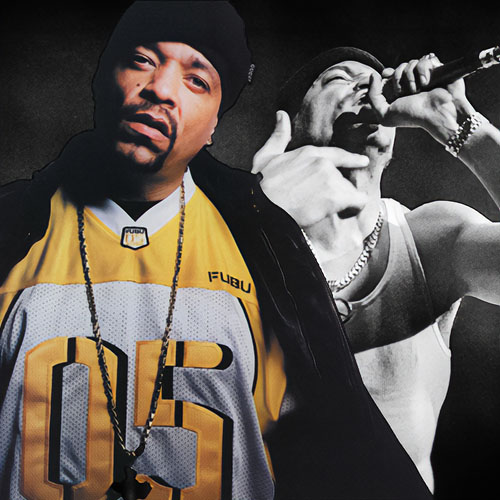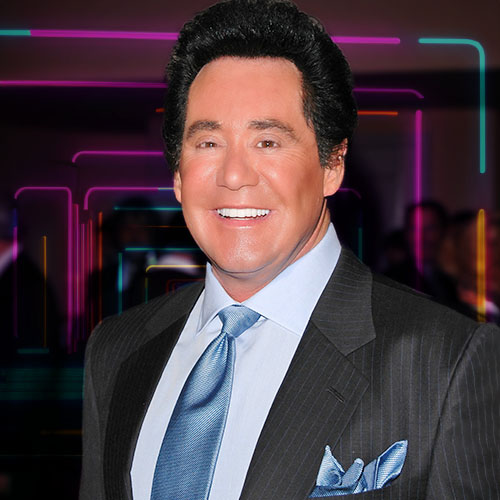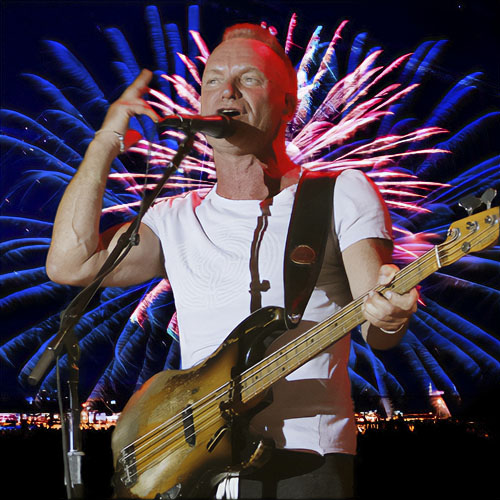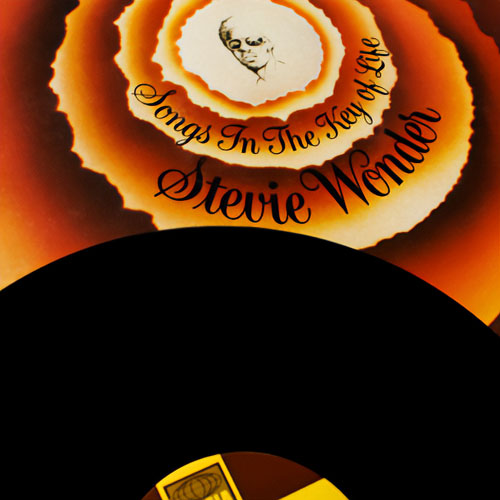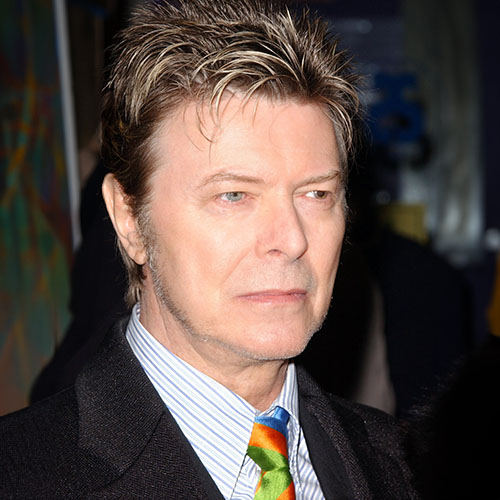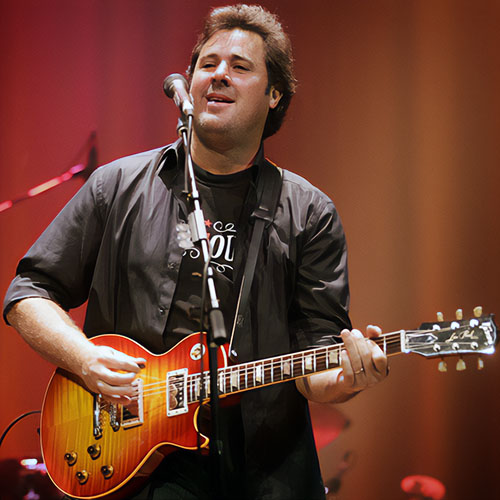Melissa Etheridge knows she’s now more famous for her life than her music, but with that came peace: “I feel like I have reached the point where I don’t have to prove myself anymore. I just want to keep creating.”
Etheridge the Lucky Lady
What a perfect time for Etheridge to be a lesbian rock star.
With gay marriage perhaps the defining cultural issue of the 2004 presidential election, and Showtime’s leggy lesbian drama, The L Word, proving so hot that the cable network ordered a second 13 episodes only 11 days after the show’s debut in January (the fastest renewal in the network’s history), singer/songwriter/activist Melissa Etheridge has never enjoyed a more mainstream place in the sun. And she’s fairly giddy about it. “Celebration,” says the 43-year-old Etheridge, with her trademark rasp, “that’s where I’m at now.”
There are several reasons for her happiness. One: Her most recent album, Lucky, boasts the hit “Breathe,” her fastest-rising single since 1995’s “I Want to Come Over.” Two: On September 22, 2003, immediately after then-Governor Gray Davis signed California’s Domestic Partner Rights and Responsibilities Act, which awarded gay and lesbian couples child-custody and financial and property rights, the rocker and her partner, 29-year-old actress Tammy Lynn Michaels (of WB’s Popular), got married in front of 200 friends and family in Malibu. The force of their union has surprised even Etheridge.
“I’d never been so purely in love before,” the singer has said. “Not until I was 40 did I find something so clear and clean. For my children, for my partner, I wanted to get married.” She now wears a small silver band; though she’d like something a little more showy, a large ring would interfere with her guitar playing, and she’d have to take it off before performances, an unthinkable prospect. But there is other evidence of devotion.
Early in their relationship — “from that sort of crazy ‘I love you forever and forever’ thing,” as Etheridge puts it — the two got tattoos with their pet names for each other. Melissa is “Lucky”; Tammy is “Angel,” which is tattooed on Etheridge’s upper left arm. “You can see it onstage. It was just a little two-minute ‘Yaaaah,’” she says, her voice going up into a fanciful float, “because I am not the tattoo type. But it was fun.”
Despite the 14-year age difference, the two seem perfect for each other. Etheridge says she was never truly content before she met Michaels. “I didn’t know what it was to be happy. I couldn’t imagine being that — stemming from my own childhood and what you take with you into adult relationships and the mistakes I kept making.”
Michaels knew plenty about being unhappy herself. That’s why in April 2001, having been outed at work, she decided to finally come out in public at Felt, a gay bar in West Hollywood, while with a pack of friends on ladies’ night. On that particular evening, Etheridge — an advocate for gay rights since 1993, when she publicly declared herself a lesbian at the Triangle Ball, the gay inaugural party for President Bill Clinton — was feeling cocky. “I would go to that bar with Ellen [DeGeneres],” Etheridge remembers. “We’d be [Frank] Sinatra and Dean [Martin], and we’d sit there and go, ‘We the most famous lesbians.’”
When Etheridge came out, she didn’t consider it courageous. “I felt it was something I had to do. It was just vital to survival. I could no longer go on answering questions and tip-toeing around it.” But then her record sales zoomed from one million to six million per album, giving her a newfound confidence, even as right-wingers like the Reverend Fred Phelps — whom Etheridge calls “the insane guy in Kansas who picketed Matthew Shepard’s funeral” — routinely showed up to make trouble whenever she played in her home state of Kansas.
On that April night at Felt in California, such negativity was far from her mind. It was Michaels who made the first move, asking Etheridge to dinner after seeing her across the room. “I was like, ‘Whoa! Jesus!’” says Michaels. The singer would later write the song “Come on Out Tonight” about the moment, as she describes it: “Yeah? You want to come on up to number one? Well, are you ready for the spotlight? Because you’re going to have to come out.”
Etheridge, at the time emerging from a dark period after her much publicized 2000 break with videographer Julie Cypher (the biological mother of their children, daughter Bailey, seven, and son Beckett, six, by musician David Crosby), said yes to Michaels’s invitation, even though Etheridge was usually attracted to unavailable women her own age. Still, she never dreamed that the young actress, who usually dated women older than Etheridge, would be so mature beyond her years.
The two found much in common. Etheridge had grown up isolated and depressed in Leavenworth, Kansas, emotionally distanced from her mother, who disapproved of her daughter’s homosexuality, alluding to Melissa’s “psychological illness” after the singer brought a girl home to spend the night. And there were other traumas. Etheridge claimed in her 2001 auto-biography, The Truth Is… My Life in Love and Music, that she was sexually abused by her older sister, Jennifer, for five years, starting at age six.
“She began to want things from me,” Etheridge wrote, “things I was uncomfortable with. I know that all kids experiment and play doctor, and that might have been all Jennifer thought it was, but it sure wasn’t that to me. At night, in the bedroom of our home, she would be gentle with me, talking sweetly to me, which was curious in itself…. Her pants would slide off and I would follow her directions. Her instructions: Do this, do that. The words sounded nice, but there’s nothing nice about it. She wasn’t my friend. It felt like something was being taken from me. And I felt horrible. Just horrible. I would step outside myself and just watch…. I knew that touching her was wrong, and I knew that it was something that would never be talked about. Not in our family. I felt tremendous shame, though I didn’t know what to call it at the time.”
Etheridge used music to vent her loneliness and confusion and explore her sexuality, later escaping to California to play in lounges and gay bars. Today, she and her sister — who, ironically, share a birthday — have an agreement not to discuss the issue.
Etheridge, on her life with actress Tammy Lynn Michaels: “I’m writing the sexiest, coolest songs I’ve ever written.”
Michaels also had a difficult childhood, growing up in staunchly Catholic Lafayette, Indiana, without a father, her divorced cocktail-waitress mother so strapped for funds that the family was often homeless. “Overall,” says Michaels (who has been in therapy since the age of three), “I was abused in every way until I was 12.” She says she figured out she was gay in the first grade, and at 13 found herself with a flaming crush on a female teacher. After high school she turned to acting as a way to get out of small-town Indiana and everything it represented.
Michaels’s troubled past makes her the perfect actress for the small but commanding role of Lacey, a wounded stalker, on The L Word, for which Showtime uses Etheridge’s song “Breathe” in promotions. Lacey, who’s fixated on Shane (Katherine Moennig), the androgynous love-’em-and-leave’ em hairdresser who sports rock-star leather pants and bracelets, might have sprung from Etheridge’s real-life past, especially since the earthy singer admits she notoriously mowed through women in her youth.
Today, the most ardent of Etheridge’s admirers throw their undergarments onto the stage, much to the rocker’s dismay. “I’m really not a fan of it, but no matter how much I say that… Well, I never would want to stifle anyone’s impulses, but let’s put it this way: The tech who reaches it first [to remove it from the stage] gets a special bonus.” The more dangerous fans are the ones who occasionally make it past security to grab Etheridge around the neck, “and that can be painful, because they don’t realize how strong they are with that adrenaline flowing.”
To dissuade the obsessive (“People want me to do all sorts of strange things”), she allows no photos when meeting crowds backstage prior to the show, and she refuses to let her children be photographed. When such subjects come up, she steers the conversation back to her various causes and concerns. And to what she sees as her reason for being. “You’ve got to feel that whatever your purpose is on earth, you’re doing it, you’re moving toward it,” Etheridge says of her social activism and her music. “And I definitely feel that I am doing what I am supposed to do.”
When she landed her recording contract in 1986 at age 25 — during a decade in which such testosterone-heavy groups as Guns N’ Roses and Motley Crue ruled the charts — she and Island Records founder Chris Blackwell adopted a “don’t ask, don’t tell” policy regarding her sexuality, even though she already had a rabid following of lesbian club-goers.
“We came to a little agreement,” she told a California newspaper last winter. “They would not ever ask me to deny [I’m gay] or present me as something I wasn’t, like in videos— and I would not, I think the term was, flag-wave.” And she kept the pronouns neutral in her songs. Then came the Clinton inaugural ball, where she uttered the words that changed everything. “I’m real proud to say I’m a lesbian,” she declared, driving the point home by locking lips with horror cult figure Elvira.
Now, with the Defense of Marriage Act at the forefront of the national consciousness, Etheridge feels the need to speak out again, only louder. “Our great country won’t allow me to get [legally] married, but it will sure let me get divorced,” she says with a trace of bitterness, outlining what she sees as unfair tax penalties in homosexual breakups, particularly the dissolution of her 12 years with Cypher, to whom she paid a form of alimony, or, as Etheridge puts it, an “amicable settlement.”
“It just took so long, because in a regular marriage, you divide it down the middle. But because they wouldn’t let us get married, I got taxed for anything I gave to her, and she got taxed for it too. So the easy ‘This is yours, this is mine, bye-bye’ became super crazy and entangled. I was seriously penalized financially for what should be a civil liberty. I just start moanin’ and groanin’, ‘What the heck is our crazy government thinking?’ with the hoops and the pretzels we have to go through.”
Still, she and Michaels have been criticized for not going to Canada, where same-sex marriages are fully recognized by the government, and for “settling” for what some gay-rights advocates see as second best: no federal protection, and no transfer of rights from state to state. But even accepting the compromise, Etheridge told The Advocate, is a statement, “because I have a belief in my heart that very soon, the walls and gates that have been held closed by people with narrow minds and fear and hate in their hearts will burst open. When they finally let the ‘coloreds’ use their bathroom or their washroom, we all didn’t die, did we? No. It’s the same thing.”
And yet, in a sense, she hasn’t made as much political hay with her marriage as some fans would like. When she and Michaels said their vows, “it was disappointing that she didn’t make it clear we can’t legally get married,” says gay fan Wendi Schwartz, 45, of Virginia Beach, Virginia. “But then her whole life is political, and maybe she shouldn’t have to make a statement with every move she makes.” Others are more critical. By using the word wedding, they say, Etheridge has given the false impression that same-sex couples can really tie the knot, which doesn’t help further the cause. Etheridge is aware of such tongue-wagging, telling People magazine, “It felt like a wedding, looked like a wedding, and cost like a wedding, so to me, I’m married, okay?”
Tom Hanks, who’s been a friend of Etheridge’s for eight years, understands the dichotomy. “When you talk about what she’s done for gay rights, she’s been ideal, a perfect blend of personal common sense and political activism,” he says. “I don’t think she is an activist in the way a lot of other people are activists. She just is what she is. It’s not a matter of power or influence. And that’s refreshing. Because when we get together, we talk a little bit about what goes down in the business, but then she’ll say, ‘I learned this really cool card game on the road.’”
At an age when most female rockers put the heavy traveling behind them, Etheridge still tours every year, and estimates that half her audience is lesbian, the other half couples and straight women. (“They leave the boyfriends and the husbands at home, and they go crazy!”) She spent the spring of 2004 on an intimate club tour, where she enjoyed a different kind of vulnerability with an audience that knows her primarily from full-tilt arena shows. In a larger venue, Etheridge says, “I kept thinking I had to be bigger than myself to fill it up, and, even though I don’t think I succeeded in doing that, I always had this urgent feeling about it. Actually, I am bigger when I am smaller-less-is-more kind of thing.”
The tour was to promote her eighth album, Lucky, named for that strategically placed tattoo and Etheridge’s new-found happiness with Michaels. “I’m writing the sexiest, coolest songs I’ve ever written,” she said in summer 2002. At the time, she was looking forward to the imminent release of an optimistic album that would follow 2001’s Skin, the dark reflection on her split from Cypher, whom she’d met on the video shoot for her first single in 1988.
But when the two-time Grammy winner turned in the new CD to Island in September 2002, her longtime record company rejected it, saying the mixes with engineer David Cole, coproducer of Skin, were too tainted by “computer wizardry.” Etheridge then rerecorded the songs with another group of musicians and a new engineer, Ross Hogarth, known for his albums with Jewel, Celine Dion, and the Black Crowes. Island, which had by then become a major hip-hop label, also scotched that effort, moving Etheridge to team with her old friend John Shanks. The two collaborated on writing a song, “This Moment,” which turned out to be a keeper. Still, Island didn’t hear anything the label could get on the radio, and suggested Etheridge record “Breathe,” a tune written by the Island band Greenwheel about longing for your lover.
Etheridge, who had already sold 25 million albums, had always relied upon her own material, and was horrified at the idea. “This is it, it’s over,” she said at the time, also admitting she wasn’t sure she knew how to write a hit song for today’s radio climate. But she changed a few words, picked up the tempo, and made “Breathe” sound like her own. It became the album’s first single. While today she concedes she’s trying to work with her record label, she also says, “I feel real lost…. I’m just trying to do my music.” As for her final feelings on the decision to record the Greenwheel song, she says, “Ask me in ten years…. I feel a little naked about it.”
Lucky is steadfastly rooted in the rock-’n’-roll spirit of “Bring Me Some Water,” “I’m the Only One,” and “Come to My Window,” from Etheridge’s first albums, and the positive love songs — “If You Want To,” “When You Find the One “— sound as if she’s been musically set free. Yet while the album celebrates the richness of her settled life, it also offers the moving “Tuesday Morning,” about Mark Bingham, a gay man who joined with the other heroes of Flight 93 to crash that plane in a Pennsylvania field on September 11, 2001.
Often, singer-songwriters who fall wildly in love find their music gets flabby when they quit writing about searing emotional pain and celebrate a life of bliss. Etheridge admits that the possibility made her record company and management folks nervous, and that she had her own doubts as well. (“I never thought it would be so hard to write about being happy …. The best songs I’d written are the ones that had an I’m-so-very-sad-and-alone theme.”) But the album met critical and commercial success, debuting at No. 15 on the Billboard album chart in February. Still, the question remains: How long can a female rocker in her forties last?
“I think she can sustain for quite a while,” says Scott Shannon, deejay and program director of WPLJ radio in New York City. Shannon, who calls Etheridge “the Bruce Springsteen of women rockers,” both for her excitement onstage and her social consciousness, also believes she’s capable of having several more big, relevant hit albums. “Anytime you’re a skilled, talented songwriter like she is, you’re always a threat. She’s very savvy, she’s very soulful, and she writes from the heart. She could go off in your face anytime.”
The hybrid rock ‘n’ roller Rosey, who opened for Etheridge’s 2002 tour, concurs about Etheridge’s staying power, particularly in concert. “She built this hard-core fan base over the years by working her ass off, and her audience would still be there no matter if she didn’t have an album. She’s like those hippie bands that people go see year after year, except for women.”
Yet Etheridge admits that she’s now more famous for her life than her music. Her private life is routinely reported in mainstream magazines, which dote on cozy details of the couple’s 1920s farm-house, their two dogs and three kittens, a Christmas present from Etheridge to the Mrs. (Michaels has taken Etheridge’s last name, but does not use it professionally.) The children spend one week with Etheridge, the next with Cypher, who lives in the same Brentwood neighborhood. Etheridge won’t stay away from the kids for more than ten days, working on the weeks she doesn’t have custody.
The singer grudgingly cooperates with the press, but only to a point. It was a tabloid’s reporting that David Crosby had been Etheridge and Cypher’s sperm donor that drove them to appear on the cover of Rolling Stone in January 2000. (“He’s musical, which means a lot to me, and I admire his work,” Etheridge explained.) Etheridge was doubtless happy to hear Crosby declare, “Maybe it’s a good thing for a lot of straight families to see that it’s not something strange,” even if such public peeks into her private life make her uncomfortable. “The feeling that I get from people is one of respect, though. I couldn’t ask for anything more than that.”
“We’d be [Frank] Sinatra and Dean [Martin],” Etheridge recalls, “and we’d sit there and go, ‘We the most famous lesbians.’”
Still, it was embarrassing when she and Cypher broke up only months after the Rolling Stone cover, Etheridge having just told talk-show host Larry King that Cypher was the love of her life, “no doubt about it.” In fact, trouble had been brewing for a long time. Etheridge was constantly away on tour, and Cypher, who had been married to actor Lou Diamond Phillips when the two women met, had begun rethinking her sexuality, deciding she wasn’t really gay after all. Cypher was often taunting and abusive, the singer says, and objected to seeing the couple’s life turned into fodder for songs. She says Cypher angrily withheld her affection and their sex life became nonexistent, something that Etheridge tolerated for as long as she could, struggling to make the relationship work. She hung in largely to give their children a stable family environment.
“It became that, yes,” Etheridge confirms. “But when I look back, I see a lot of it has to do with what I was raised with. I got very little affection from my mother, so in a way it felt normal.” While at first Etheridge’s mother bristled against such public family scrutiny, she now says she’s proud of her famous daughter, who, for her part, insists she would rather tell the truth than “carry around the darkness and the secrets and the pain. That’s such a burden.”
As open as Etheridge is, the one thing that people don’t know about her offstage persona is how funny she can be. That’s partly why stars like Tom Hanks, Gwyneth Paltrow, Courteney Cox Arquette, and Jennifer Aniston count her among their friends. The first time Hanks had dinner with her, which had been arranged through mutual friends, “all we did was laugh,” he says, “and ever since then, that’s all we’ve been doing.” Their friendship is “based on affection, pure and simple, and some degree of mutual admiration ,” says Hanks, who at one point, along with Brad Pitt, was rumored to be the father of Etheridge’s children.
Hanks continues, “The first time we met, she gave me one of those books of sewing patterns, all about those great sweaters with belts from the seventies. It was hilarious, like, ‘We have a kindred spirit here.’ But she’s amazing, and, of course, a true artist. She also throws a great party, man. You’d better be willing to dance so much that you gotta take your shirt off before the evening’s done and wave it over your head. It’s a blast!”
Yet others who have worked with Etheridge professionally say there’s another side to her, and insist that once fame settled in, her personality changed from that of an eager hopeful, grateful for any help up the ladder, to a snappish egomaniac. “Arrogance and supreme-being syndrome is a problem for a number of the musicians I have worked for,” says one music-industry insider. “Melissa holds one of the top spots.”
Etheridge acknowledges that success and notoriety bring their own difficulties. “Fame is like a psychological problem,” she says. “It’s a huge magnifying glass. Anything that you have going on, it just makes it bigger, so it doesn’t take care of anything.”
Just where she’ll go from here will likely have more impact on Etheridge’s legacy as an artist than as a social activist, even as “Giant,” a song on Lucky, reaffirms her stance as a soldier in the fight for sexual freedom. An early supporter of Howard Dean’s candidacy, she’s made it clear she will back any Democrat for president, particularly in light of George W. Bush’s stand against gay marriage. “When the president takes this debate up and makes a choice to side with the ultraconservative religious right,” she told a newspaper this past February, “I’m horrified. I’m finally angered.”
But personal matters seem to be more on her mind. She and Michaels want to expand their family, and are considering sperm donors. For the time being, perhaps, the singer is going to work harder to protect her own personal changes than to affect global ones. “I feel that I climbed to the top of my dream and got up there and brought all of my baggage with me and went, ‘Well, the view appears pretty much the same as it was everywhere else, and it is not going to settle my problems,’” she says. “I had to jump into my deepest fears, and by doing so, I’ve been rewarded immensely. I have a new home and a new life. I have things I would love to do in the future, but I feel like I have reached the point where I don’t have to prove myself anymore. I just want to keep creating and keep exciting people with me.”
We would love to tell you that we searched high and low for the remarkably topical header image for this Legacy entry, it being Melissa Etheridge performing at the 2000 Democratic National Convention, what with the 2024 Democratic National Convention closing on this very night. We would also love to tell you that Ms. Etheridge so loved our interview that she returns annually to our office to give us a private concert. … Sadly, neither of those things would be true. … In much better news, you can still see Melissa Etheridge on tour these days, although based on her wonderfulness, it seems unlikely these would be very private performances.

















